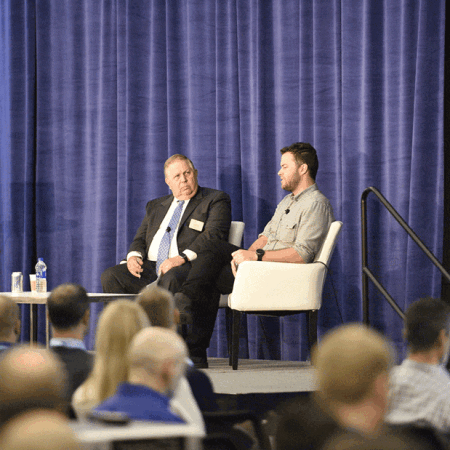The commercial real estate sector is poised to undergo a radical technological transformation in which it will be as quick and easy to buy or sell a home as it is to order a new iPhone, in which blockchain and digital tokens will allow commercial real estate assets to be split into tiny shares that can be easily traded, and in which construction companies will deploy autonomous bulldozers to grade sites and make up for a shortage of skilled labor.
Those were just some of the transformative innovations described by venture capitalist Brad Greiwe in a session on technological change at the 2018 ULI Fall Meeting in Boston.
Some of the technologies might pose “an existential threat” to established players in the real estate sector, but they also hold the promise of creating new sources of capital and ways of monetizing assets, Greiwe said.
He is in a position to know. Greiwe is cofounder and managing partner of Fifth Wall, a two-year-old Venice, California–based venture capital firm that aims to “accelerate innovation in the Built World,” according to its website. Fifth Wall’s investors include major commercial real estate companies, ranging from residential homebuilder Lennar to logistics real estate giant Prologis.
Fortuitously, Fifth Wall launched at the same time that technological advances first started rising in real estate, a sector that has lagged others in terms of innovation. Since then, investment has surged, with investors pumping $12.5 billion into real estate technology, now known by the trendy moniker realtech.
“Every real estate [firm] had to go in front of the board and discuss how tech was impacting their business,” Greiwe said.
Fifth Wall has backed dozens of companies ranging from construction technology outfit BUILT Robotics to online home marketplace Opendoor, and closed its first fund with $212 million last year. The Wall Street Journal reported in August that the firm had raised at least $100.8 million for a successor fund.
Unlike other economic sectors, in which technologies can grow explosively before it becomes clear how to monetize them, innovation in real estate has had a harder focus from the start on tangible applications, Greiwe said. In addition, the physical scale and long life cycle of real estate assets make it difficult for a new player to come up with a disruptive innovation. “It’s frustrating for VCs [venture capitalists] who aren’t accustomed to the pace of the industry,” he said. “You can’t Uber through real estate.”
Greiwe was particularly enthused about Lennar’s adoption of Opendoor’s platform, which he said makes it possible for a consumer to quickly sell his or her home and trade up to a new one without having to spend months dealing with the traditional homebuying process. He said it could make homebuying as easy as upgrading to the latest iPhone.
Greiwe also touted blockchain’s potential to transform real estate investing by streamlining the process and making it possible for small investors to buy fractional pieces of real estate projects and to invest in regional markets to which they might not normally have access. “Right now, I can’t invest in Cincinnati, because there aren’t a lot of REITs there—you’d have to buy a whole building,” Greiwe said. “That gives me a chance to invest in the place where I grew up.”
While blockchain—basically, a distributed digital ledger—is often associated with cryptocurrencies such as bitcoin, Greiwe said that using it for real estate investments is safer, because the transactions involve actual physical assets rather than value that exists only in the digital world. The tokens used in such transactions are basically digital securities, and unlike bitcoin, there is no risk of losing the investment if the password is lost, he said.
Greiwe said that big-data analytics and machine learning have the potential to provide strategic insights that are not available today, but they are hindered by the lack of industry standards for collecting and structuring data. “There’s too much ingrained inefficiency in our data platforms,” he said.
He also expects that as owners install solar panels and other localized energy sources on their buildings, the real estate sector will transition from being a massive consumer of energy to a producer. Greiwe also foresees robotics having a major impact in reducing the growing shortage of construction labor. And he envisions augmented reality, or AR, in which information is added to a user’s visual field, as having a major impact. The technology could make it possible to guide an HVAC repair technician to the location of a broken piece of equipment and then display information on how to fix that particular model, he explained.
Online marketplaces may eliminate some jobs, but it will make brokers more efficient and productive, Greiwe predicted.
Greiwe was interviewed by Randy Rowe, chairman of real estate private-equity firm Green Courte Partners, and immediate past global chairman of ULI. Rowe joked that he was tempted to wear jeans instead of a suit to the session so that he could pass as a venture capitalist or tech executive. “But I just couldn’t do it,” he said.



